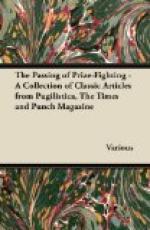* * * * *
Nothing, one would imagine, could promise much more restful reading than a book that concerns itself with such things as christening robes for caterpillars, the dyeing blue of white chickens and searches among Californian lilies and pine-trees for the soul of a hog unseasonably defunct. But, since this most uncharitable age refuses to believe anything just because it is told it should, the peaceful pages of The Diary of Opal Whiteley (PUTNAM) are unfortunately fussed over with a controversy that no one who reads them can quite escape. Miss WHITELEY’S diary is presented with every circumstance of solemn asseveration as the unaided work of a child of seven, only now pieced together by the writer after quite a number of years. If you care to throw yourself into the argument you will certainly find heaps of reasons for thinking unkind thinks, as the writer would say, of the truth of this claim, particularly in the completeness with which every incident is carried through various stages to its literary finish; but, if you will be ruled by me, you will try to forget anything but the book itself, with its quite charming pictures of many animals and one little girl, their understanding friend. The quaint idiom in which the diary is supposed to have been written (or, of course, was written) adds to the delight of a rather uncommon feeling for nature at its simplest, while the scrapes for which the small heroine receives (or, you may say, is alleged to receive) well-deserved punishment preserve the book from ever dropping into mere mawkishness. A great pity, I think, that it was not published rather as based on childish memories than as the actual printed script of a prodigy.
* * * * *




